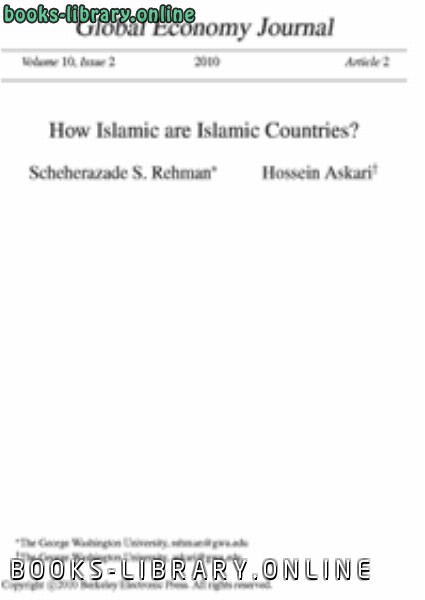📘 قراءة كتاب How Islamic are Islamic Countries أونلاين


In the post 9/11 era, there is growing interest in the complex relationship between religion,
economics, finance, politics, law, and social behavior. This has brought with it a disagreement
on how to investigate the impact of religiosity, whether religion affects the economic, political,
and social outlook of countries or whether these factors affect religiosity? In other words, should
religion be viewed as a dependent or an independent variable? In this paper we ask what we
believe to be the precursor question to such linkages, namely, do self-declared Islamic countries,
as attested by membership in the OIC (Organization of Islamic Conference), embrace policies
that are founded on Islamic teachings? We believe that only once this question is addressed can
one begin to estimate how Islam adherence to Islam may affect economic, political and social
behavior. In the first part of the paper we present what we believe should be the characteristics and
scaffolding of an “Islamic” country. We base our depiction on the Quran, and the life, practices
and sayings of the Prophet Mohammad – the two principal channels that provide Muslims with
the road map. In the second part, we develop an index to measure the “Islamicity” of Islamic and
non-Islamic countries. This IslamicityIndex (or I2
) measures 208 countries adherence to Islamic
principles using four sub-indices related to economics, legal and governance, human and political
rights, and international relations.
KEYWORDS: Islam, economic development, index, religion, economics,
Book ? author : Scheherazade S. Rehman and Hossein Askariy
سنة النشر : 2010م / 1431هـ .
حجم الكتاب عند التحميل : 289 كيلوبايت .
نوع الكتاب : pdf.
عداد القراءة:
اذا اعجبك الكتاب فضلاً اضغط على أعجبني و يمكنك تحميله من هنا:

شكرًا لمساهمتكم
شكراً لمساهمتكم معنا في الإرتقاء بمستوى المكتبة ، يمكنكم االتبليغ عن اخطاء او سوء اختيار للكتب وتصنيفها ومحتواها ، أو كتاب يُمنع نشره ، او محمي بحقوق طبع ونشر ، فضلاً قم بالتبليغ عن الكتاب المُخالف:
 قبل تحميل الكتاب ..
قبل تحميل الكتاب ..
يجب ان يتوفر لديكم برنامج تشغيل وقراءة ملفات pdf
يمكن تحميلة من هنا 'http://get.adobe.com/reader/'


 منصّة المكتبة
منصّة المكتبة 